


The article highlights ten critical signs of cardiovascular disease that elderly patients should be aware of, emphasizing the importance of early detection and proactive healthcare management. Are you aware of the subtle signs that could indicate a heart issue? Understanding symptoms such as chest pain, shortness of breath, and fatigue can empower you to take charge of your health.
These symptoms carry significant implications for heart health, reinforcing the necessity for regular check-ups. In addition to this, open communication with your healthcare providers can greatly improve outcomes. Remember, you are not alone in this journey; support is always available.
By recognizing these signs early, you can take proactive steps towards maintaining your heart health. It’s essential to prioritize your well-being and seek help when needed. Together, we can work towards a healthier future.
Recognizing the early signs of cardiovascular disease is crucial, especially for our elderly loved ones. Subtle symptoms can easily go unnoticed, which is why understanding these warning signs is so important. With cardiovascular conditions being the leading cause of death globally, empowering individuals to seek timely medical intervention can significantly improve health outcomes.
What are the key indicators that seniors should be vigilant about to safeguard their heart health? In this article, we explore ten critical signs of cardiovascular disease that every elderly patient should know. By emphasizing the importance of awareness and proactive healthcare, we hope to provide reassurance and support on this journey towards better heart health.
At Amavita Heart and Vascular Health, we understand that recognizing the early signs of cardiovascular disease is vital for elderly patients. Symptoms can often be subtle and easily overlooked, making awareness essential. Regular check-ups play a crucial role in early detection, allowing healthcare providers to identify risk factors and symptoms before they escalate.
Cardiologists stress that prompt action can greatly enhance results. Cardiovascular conditions continue to be the top cause of mortality worldwide, representing roughly one in three fatalities in 2023. Furthermore, about 1 in 20 adults aged 20 and older have coronary artery disease, underscoring the need for vigilance.
Open communication with healthcare providers encourages a proactive approach to heart health. This ensures that individuals receive the necessary screenings and treatments customized to their needs. By prioritizing regular check-ups, elderly individuals can take significant steps toward maintaining their cardiovascular health and enhancing their quality of life. Remember, caring for your heart is a journey we can take together.
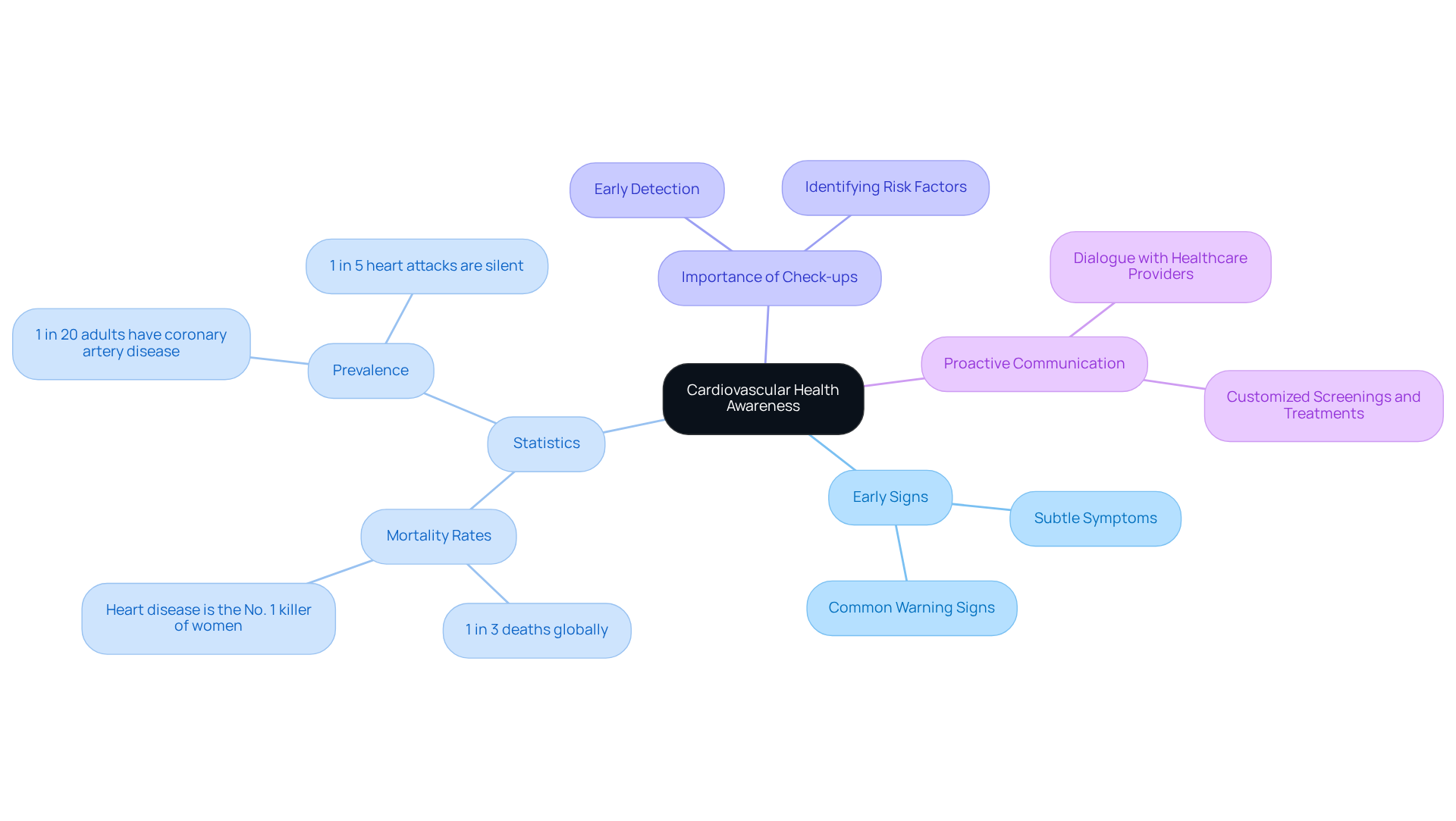
Chest pain can feel like pressure, squeezing, or fullness in the chest, and for elderly patients, it may not always be intense; sometimes, it can be mild or even mistaken for indigestion. This nuance is essential to understand, as studies suggest that older adults often experience unusual signs, such as nausea and dizziness, which can complicate diagnosis. If you experience chest pain, it is vital to seek medical advice, as it may indicate signs of cardiovascular disease, including angina or heart attacks. In fact, over 7 million individuals in the U.S. are hospitalized each year with chest pain indicative of acute coronary syndrome, highlighting the prevalence of this condition among older adults. Cardiologists emphasize that even mild chest pain can be considered one of the signs of cardiovascular disease that should not be ignored, as timely intervention can significantly improve outcomes.
With Amavita's CardioElite™ program serving as a clinical force multiplier, elderly individuals benefit from advanced, real-time diagnostic information and thorough evaluations. This ensures that even subtle indications are addressed proactively. The incorporation of AI and AHA certification within the program enhances its efficiency in managing cardiac patients, resulting in better recovery rates. Patients who act quickly when experiencing chest pain often receive more effective treatment, which can potentially save lives. Dr. Jessica Sutherland emphasizes that individuals should not delay in seeking medical assistance for any signs of cardiovascular disease related to coronary issues. The CardioElite™ program plays a significant role in delivering prompt and efficient care, ensuring that you are supported every step of the way.

Shortness of breath, or dyspnea, is a common concern among older adults, often appearing during physical activity or even at rest. This symptom can signal signs of cardiovascular disease, such as organ failure or valve disease. Did you know that approximately 1 in 5 older adults experience dyspnea when climbing stairs or walking uphill? This statistic highlights how important it is to monitor breathing patterns in this demographic.
As a senior, it’s essential to be attentive to your breathing. Take note of any changes, such as increased difficulty or frequency of breathlessness. Early detection of dyspnea is crucial, as it can lead to timely interventions that significantly improve treatment outcomes. At Amavita Heart and Vascular Health®, we are here to help. Our innovative AI-powered CardioElite™ program enhances early detection through advanced diagnostic technology, including a portable, FDA-cleared AI ultrasound for bedside cardiac diagnostics. This technology offers real-time guidance and generates rapid reports on heart function, empowering you to make informed decisions about your health.
Healthcare professionals stress the importance of collaborating with your provider to develop comprehensive treatment plans tailored to your individual needs. Remember, "If dyspnea occurs suddenly or if symptoms are severe, it may be a sign of a serious medical condition." Sudden or severe dyspnea can be an emergency sign, requiring immediate medical attention. Therefore, maintaining open communication with your healthcare provider about any respiratory changes is essential for effectively managing your heart health. By being proactive, you can enhance your quality of life and reduce the risks associated with the signs of cardiovascular disease.
Possible causes of dyspnea include:
This highlights the importance of awareness and monitoring. At Amavita, we also offer minimally invasive therapies for valve conditions, which can significantly improve your breathing and energy levels, often allowing for same-day discharge. We are here to support you on your journey to better health.

Unexplained exhaustion that persists despite adequate rest can serve as a crucial warning signal of signs of cardiovascular disease, particularly in older individuals. This fatigue often stems from the heart's decreased ability to pump blood effectively, leading to a reduced oxygen supply throughout the body. Did you know that nearly 42.6% of older adults report experiencing fatigue? A significant number attribute this to cardiovascular health issues. Cardiologists emphasize that fatigue is not merely a sign of aging; it may be one of the signs of cardiovascular disease.
For those at high risk, including individuals with diabetes, hypertension, or a family history of cardiovascular problems, it is vital to discuss any noticeable changes in energy levels with your healthcare provider. Early identification and intervention can significantly enhance health outcomes. At Amavita Cardiovascular and Vascular Health, we understand the connection between cardiac function and energy levels.
Our advanced imaging capabilities and comprehensive care plans are tailored to effectively manage fatigue, ultimately improving the overall quality of life for seniors. We offer personalized interventions such as:
Remember, you are not alone in this journey; we are here to support you every step of the way.
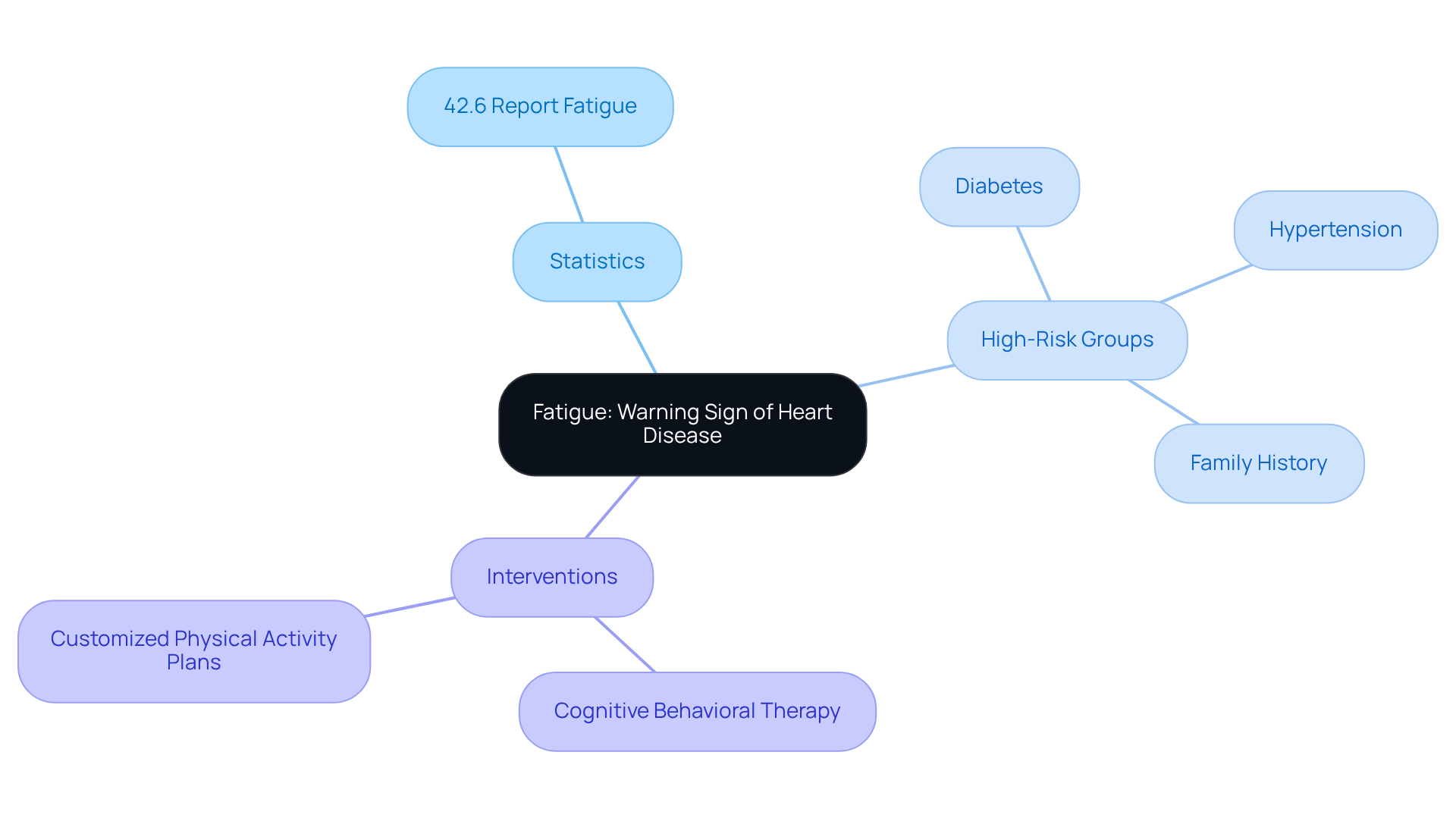
An irregular heartbeat, often described as a fluttering or racing sensation, can be a source of concern, indicating the presence of arrhythmia—a condition that may pose significant risks, including stroke and heart failure. For older adults, the prevalence of arrhythmias is notably high, with studies revealing that:
These circumstances can lead to severe effects and complications if not addressed swiftly.
Recognizing the signs of irregular heartbeats is crucial for seniors. Symptoms may include:
These symptoms can significantly impact daily life. Consider the case of a 65-year-old man with complete atrioventricular block; urgent intervention with a dual-chamber pacemaker not only alleviated his debilitating symptoms but also greatly improved his quality of life, allowing him to regain autonomy and confidence.
Cardiologists emphasize the importance of monitoring the heart's rhythms, especially in older adults. As one specialist noted, "The dual-chamber pacemaker continuously monitors and stimulates the heart in real-time, ensuring a physiological rhythm." This proactive approach to cardiovascular well-being is essential, particularly as the risk of developing arrhythmias increases with age, especially for individuals with lower fitness levels.
Amavita's CardioElite™ program enhances this proactive monitoring by providing advanced, real-time diagnostic data and 24/7 cardiology consultation, which is vital for managing arrhythmias effectively. The incorporation of AI and thorough employee training further supports elderly patients in understanding and managing their cardiovascular health.
It is important for elderly individuals to remain vigilant regarding their cardiovascular well-being and to inform their healthcare provider of any irregularities. Early detection and intervention, supported by comprehensive cardiovascular management through programs like CardioElite™, can lead to better outcomes and a higher quality of life, highlighting the critical role of awareness in managing cardiovascular health.
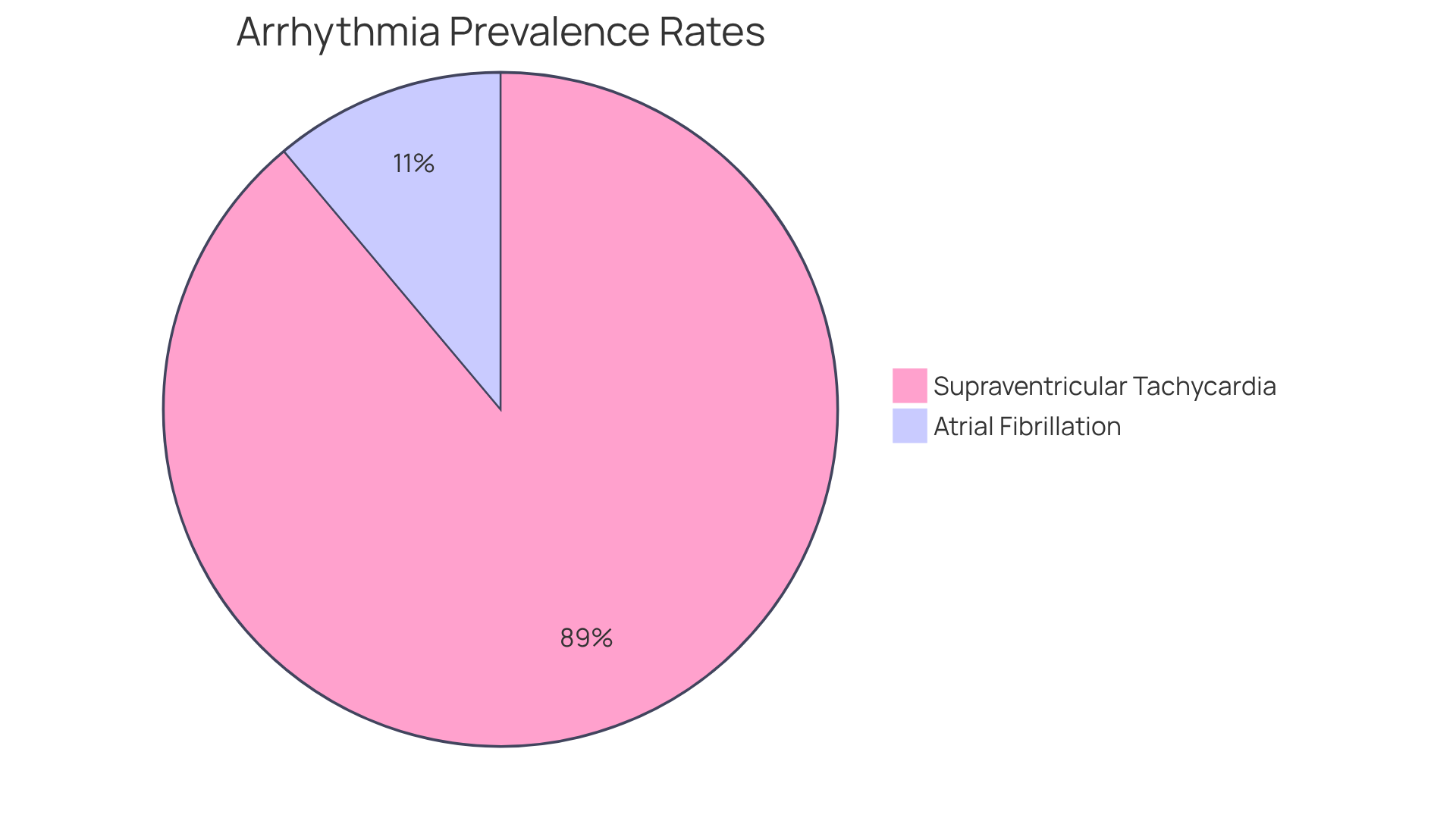
Swelling in the extremities, commonly referred to as edema, is a significant concern for older adults, particularly as it may indicate signs of cardiovascular disease. This condition occurs when the heart struggles to pump blood effectively, leading to fluid accumulation in the tissues. In fact, edema is often one of the initial visible indicators of congestive heart failure (CHF), which may also present as signs of cardiovascular disease, affecting millions worldwide and being especially prevalent among seniors.
At Amavita Cardiovascular Health®, we understand the importance of thorough cardiac assessments for high-risk individuals, including those with diabetes, hypertension, or a family history of cardiovascular conditions. Our advanced imaging and testing capabilities allow for precise diagnosis without delay, ensuring that any unusual swelling, particularly in the feet and ankles, is thoroughly evaluated. If you notice ongoing or recurring swelling, especially when accompanied by symptoms such as shortness of breath or fatigue, we encourage you to consult with a healthcare provider promptly. As specialists often remind us, "Swollen feet can indicate cardiac failure," highlighting the need for awareness in identifying this symptom.
Real-life examples illustrate the connection between edema and cardiac failure in seniors. Many individuals report experiencing sudden foot swelling or increased swelling throughout the day, which can be quite alarming. For instance, a case study revealed that an elderly patient with a history of hypertension developed significant edema, leading to a diagnosis of cardiac failure after timely medical intervention. This underscores the critical nature of recognizing swelling as a potential warning sign of signs of cardiovascular disease.
Statistics show that the incidence of CHF rises with age, affecting about 10% of the population over 75 years. Additionally, having a sibling with cardiovascular disease can increase a person's risk for cardiac issues by as much as 45%. Therefore, understanding the implications of edema is vital for early detection and management of signs of cardiovascular disease.
In summary, recognizing swelling in the extremities as one of the signs of cardiovascular disease is essential for older adults. At Amavita, we offer personalized cardiac care plans tailored to your specific condition and lifestyle, ensuring that you receive the most effective management strategies. Our preventive cardiology approach combines advanced risk assessment tools with personalized interventions, allowing for comprehensive care. We encourage you to monitor your feet and ankles regularly for any changes in swelling and to consult your healthcare provider if you notice any unusual patterns. Prompt medical attention can lead to effective management strategies, ultimately improving your overall health outcomes and quality of life.
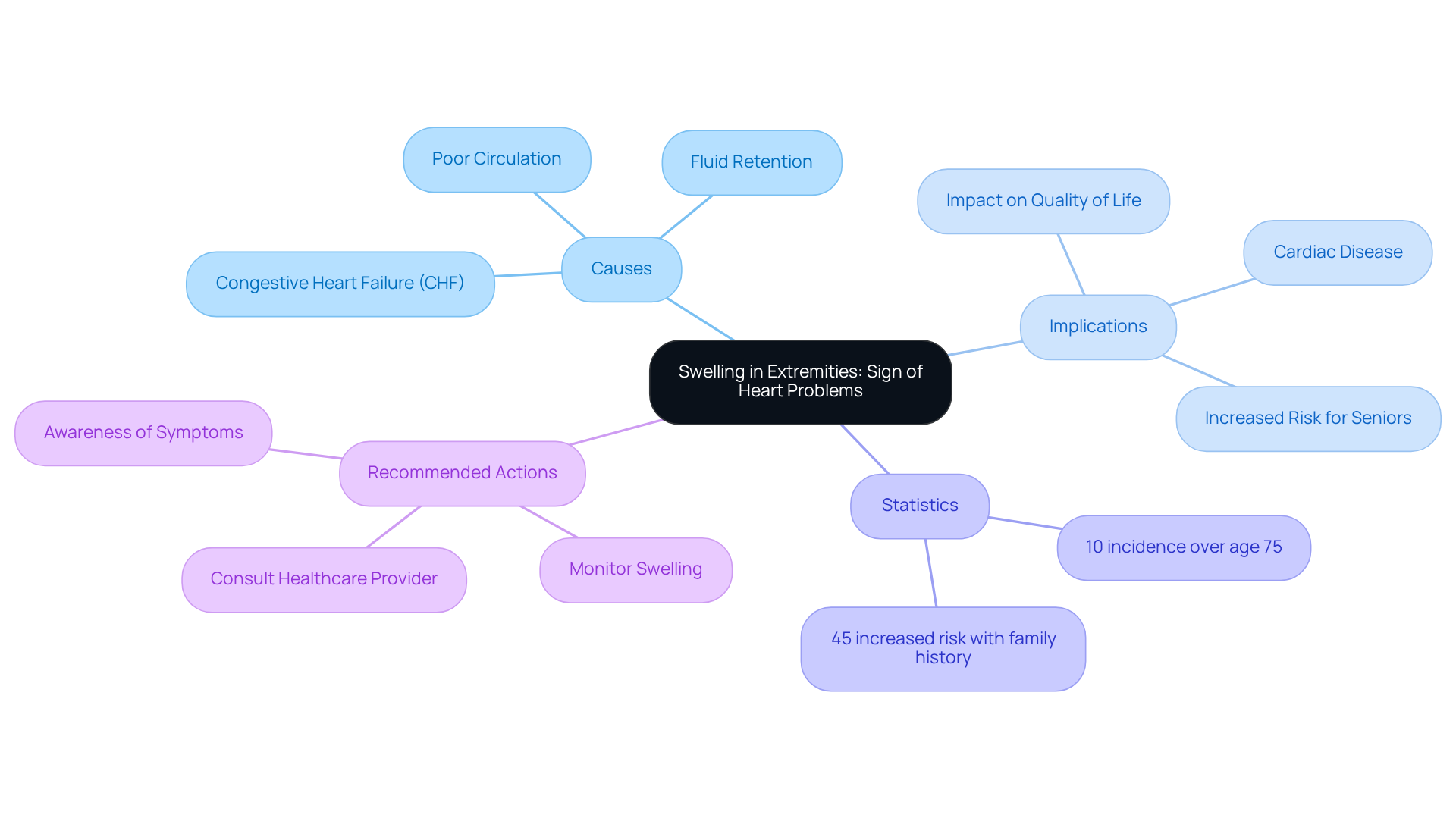
Dizziness or lightheadedness is a common concern among older adults, often stemming from reduced blood flow to the brain. This can sometimes indicate signs of cardiovascular disease that require attention. In fact, studies reveal that about 24% of individuals over the age of 72 experience dizziness, highlighting how prevalent this issue is within this age group. Such feelings can arise from various problems related to signs of cardiovascular disease, including arrhythmias and coronary artery conditions, which may impede blood circulation.
Cardiologists stress the importance of addressing frequent dizziness, as it can be one of the signs of cardiovascular disease and signal serious health concerns. For example, many elderly patients who present with dizziness in primary care settings are often found to show signs of cardiovascular disease as the primary cause. Given the multifactorial nature of dizziness, which can also involve medication side effects, it’s crucial for seniors experiencing these signs to seek medical assessment.
Early diagnosis and intervention can lead to improved management of both dizziness and the signs of cardiovascular disease. This proactive approach not only enhances quality of life but also helps reduce the risk of falls and related injuries. Remember, you are not alone in this, and seeking help is a vital step towards better health.

A persistent cough, particularly one that produces pink or white mucus, can be a significant sign of cardiovascular disease in older individuals. This symptom arises when fluid accumulates in the lungs due to the heart's inability to circulate blood efficiently, a condition known as pulmonary edema. Many seniors may notice that their cough worsens at night or when lying flat, which can be concerning and should not be overlooked.
Healthcare professionals stress that any unusual cough, especially when accompanied by:
requires immediate medical attention. Research indicates that approximately 6.7 million Americans face heart-related issues, with many experiencing a cough as a frequent symptom for months or even years, which may be one of the signs of cardiovascular disease before receiving a diagnosis. Recognizing these signs early can lead to timely diagnosis and treatment, ultimately enhancing health outcomes.
At Amavita Heart and Vascular Health®, we are committed to providing support through our advanced AI-driven diagnostic technology, part of the CardioElite™ program. This technology utilizes portable, FDA-cleared AI ultrasound for bedside diagnostics, offering real-time guidance and precise imaging that facilitate early identification of cardiovascular conditions. As one healthcare expert noted, "Coughing may indicate that your cardiovascular issue is worsening," underlining the importance of discussing any health changes openly with your doctor.
Furthermore, managing a cardiac cough through appropriate cardiovascular medication can lead to improvement, highlighting the critical need for medical advice. If you or a loved one is experiencing a persistent cough, especially alongside other symptoms, please consult a healthcare provider for a thorough evaluation. Additionally, Amavita offers preventive strategies and lifestyle changes designed to reduce the risk of cardiac events, ensuring comprehensive cardiac care.
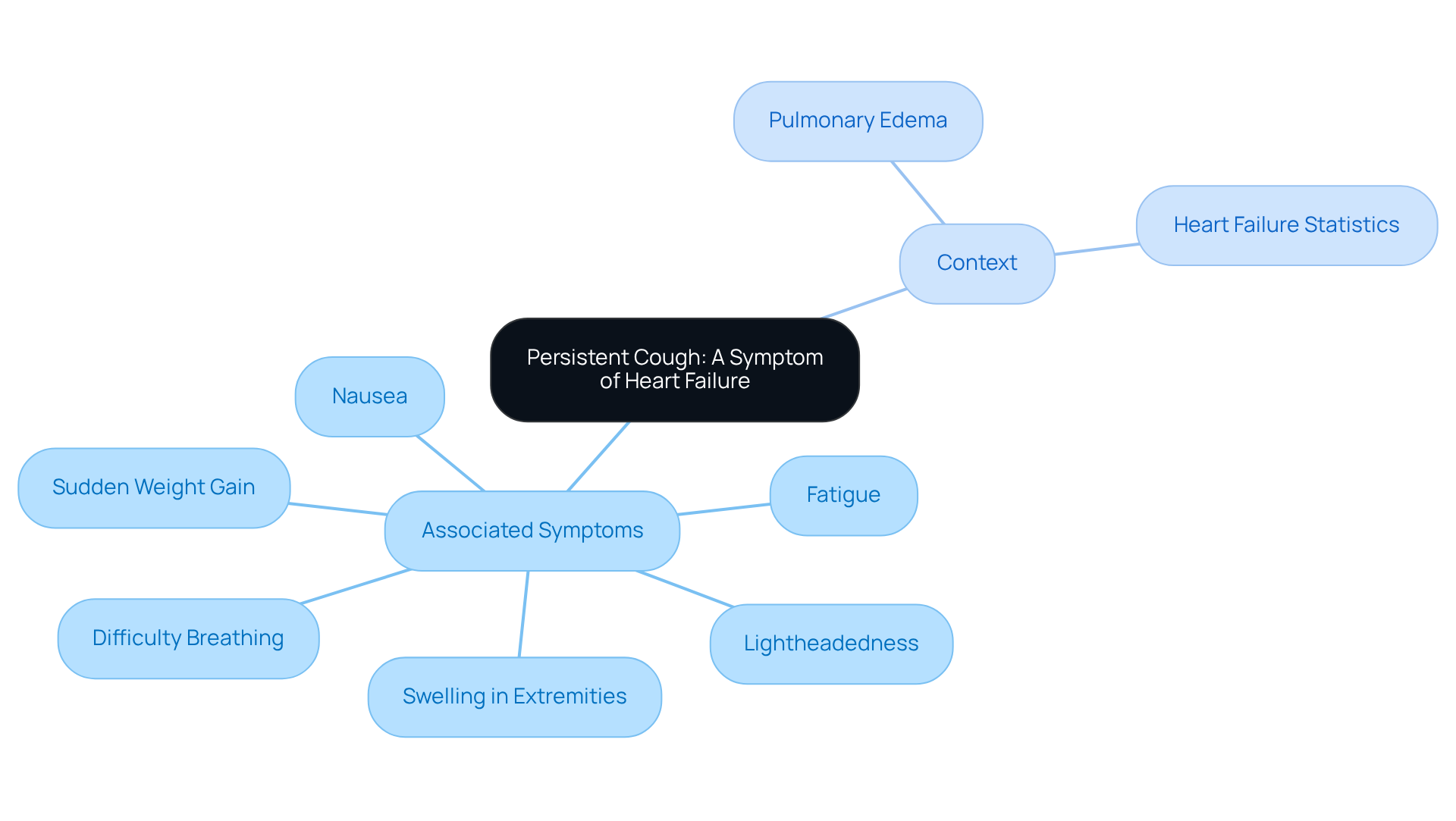
A family background of signs of cardiovascular disease significantly increases the likelihood of developing similar conditions. For elderly patients, it is essential to engage in discussions about their family medical history with healthcare providers. This dialogue can lead to a better understanding of individual risk factors and the implementation of appropriate screening and preventive strategies.
Did you know that individuals with an early family background of coronary conditions (CHD) show signs of cardiovascular disease, facing a lifetime risk of 21% for cardiovascular issues (CVD) mortality? In contrast, those without such a background have a risk of only 14.1%. Cardiologists stress the importance of acknowledging family background. As one specialist observed, "If we know that relatives have experienced issues, there are measures we can take to attempt to avert complications in the future." Understanding these hereditary factors allows for tailored health plans that may include lifestyle modifications or medications to mitigate risks.
The latest research emphasizes that older adults with a family background of cardiovascular conditions should be proactive in discussing signs of cardiovascular disease with their healthcare providers to enhance their cardiovascular health outcomes. At Amavita Heart and Vascular Health®, we offer comprehensive cardiac evaluations that utilize advanced risk assessment tools and personalized interventions, including cardiac catheterization and coronary revascularization, to significantly reduce heart attack risk.
Our minimally invasive treatments and same-day recovery options ensure that our senior individuals receive compassionate and innovative care tailored to their specific needs. We are here to support you every step of the way.
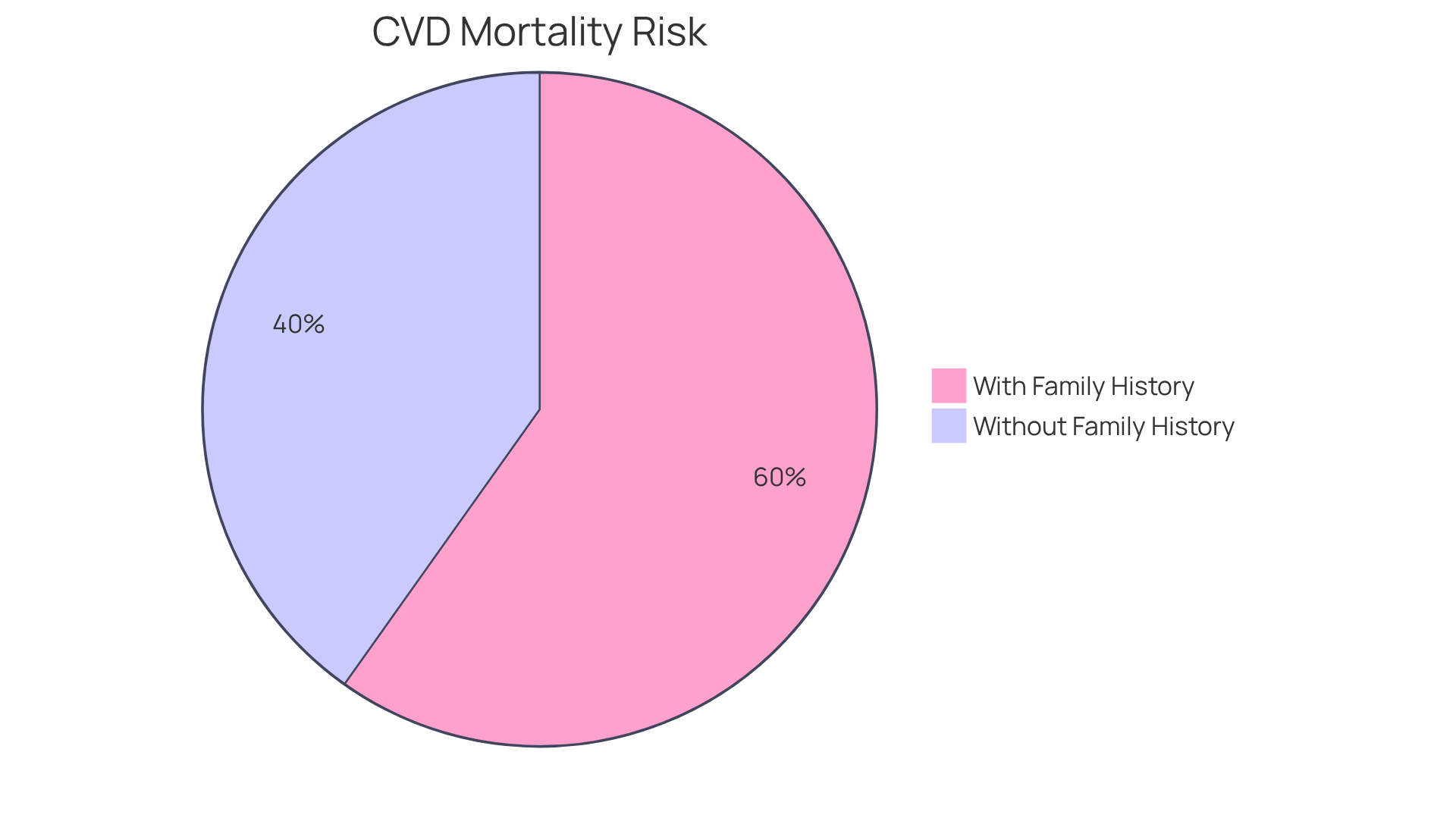
Embracing a heart-healthy lifestyle is essential for your well-being. A balanced diet, regular exercise, and avoiding smoking can significantly lower your risk of signs of cardiovascular disease. If you are an older individual, especially if you have diabetes, hypertension, or a family history of cardiovascular illness, it’s important to work closely with your healthcare providers at Amavita Heart and Vascular Health to monitor for signs of cardiovascular disease.
By developing personalized lifestyle plans that incorporate advanced imaging and comprehensive evaluations, you can promote your heart health and overall well-being. Our team is here to support you with sophisticated care options tailored to your needs. Remember, you are not alone on this journey; we are dedicated to helping you every step of the way.
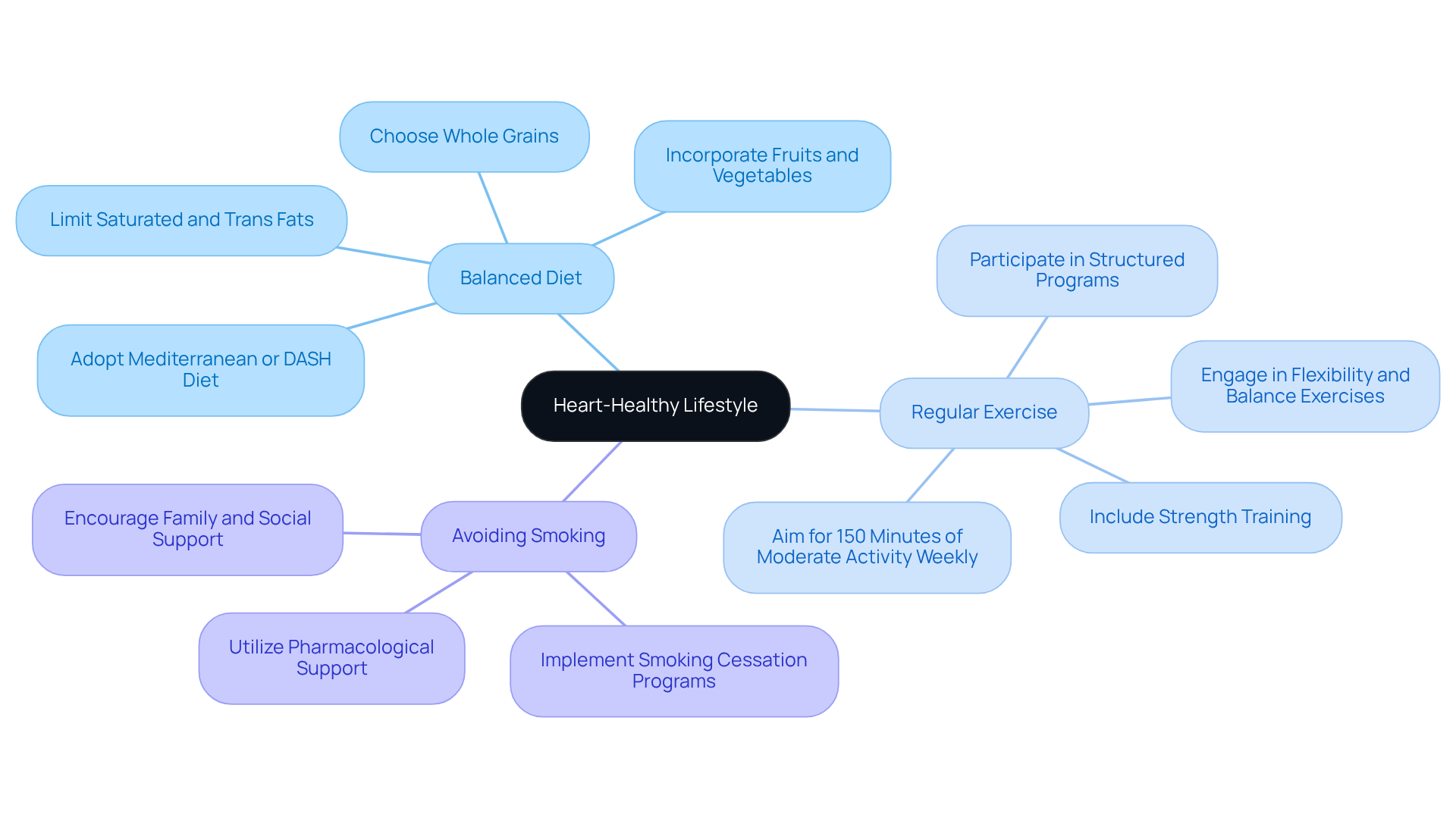
Recognizing the signs of cardiovascular disease is crucial for elderly patients. Early detection can lead to more effective interventions and improved health outcomes. Are you aware of symptoms such as:
Understanding these signs, along with your family history, can empower you to take proactive steps in managing your heart health.
Throughout this article, we highlight the importance of regular check-ups and open communication with healthcare providers. Advanced diagnostic technologies, like Amavita's CardioElite™ program, play a significant role in this journey. Each symptom serves as a potential warning sign of underlying cardiovascular issues, emphasizing the need for vigilance and timely medical attention. Furthermore, lifestyle changes, such as maintaining a balanced diet and engaging in regular exercise, can significantly mitigate risks associated with heart disease.
Ultimately, fostering awareness about cardiovascular health can lead to better management of symptoms and a higher quality of life for seniors. Encouraging proactive health monitoring and open discussions with healthcare providers can greatly enhance the chances of early diagnosis and effective treatment. Taking these steps not only benefits your individual health but also contributes to a broader understanding of cardiovascular disease within the elderly population. Prioritizing heart health is a journey worth embarking on, and with the support of healthcare professionals, you can make all the difference.
Why is recognizing early signs of cardiovascular disease important for elderly patients?
Recognizing early signs of cardiovascular disease is crucial for elderly patients because symptoms can be subtle and easily overlooked. Early detection through regular check-ups helps healthcare providers identify risk factors and symptoms before they escalate.
What are some common symptoms of cardiovascular disease in elderly patients?
Common symptoms include chest pain, shortness of breath, nausea, and dizziness. Chest pain may feel like pressure or fullness, and in older adults, it may be mild or mistaken for indigestion.
What role do regular check-ups play in cardiovascular health?
Regular check-ups are essential for early detection of cardiovascular issues, allowing for timely interventions that can enhance treatment outcomes and improve quality of life.
What is the significance of chest pain in relation to cardiovascular disease?
Chest pain can indicate serious cardiovascular issues, such as angina or heart attacks. Even mild chest pain should not be ignored, as prompt medical attention can significantly improve outcomes.
How prevalent is chest pain among older adults in the U.S.?
Over 7 million individuals in the U.S. are hospitalized each year with chest pain indicative of acute coronary syndrome, highlighting its prevalence among older adults.
What is the CardioElite™ program, and how does it benefit elderly patients?
The CardioElite™ program is an advanced diagnostic initiative that provides real-time information and thorough evaluations for cardiac patients. It incorporates AI and AHA certification to enhance efficiency and improve recovery rates.
What should elderly individuals do if they experience shortness of breath?
If shortness of breath occurs, especially suddenly or severely, it may indicate a serious medical condition requiring immediate attention. It's important to communicate any changes in breathing patterns to healthcare providers.
What are possible causes of shortness of breath in older adults?
Possible causes include asthma, pneumonia, and signs of cardiovascular disease. Monitoring changes in breathing is essential for early detection and intervention.
How can the CardioElite™ program assist with shortness of breath?
The CardioElite™ program utilizes advanced diagnostic technology, including a portable AI ultrasound for bedside cardiac diagnostics, to provide real-time guidance and rapid reports on heart function.
What should elderly patients prioritize for maintaining heart health?
Elderly patients should prioritize regular check-ups, open communication with healthcare providers, and awareness of symptoms to effectively manage their cardiovascular health and enhance their quality of life.